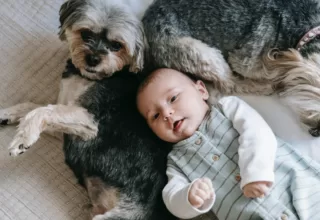Are Certain Dog Breeds Better with Babies?
Outline
- Introduction
- Factors to consider when choosing a dog breed for babies and personality traits
- Dog breeds known for being good with babies
- Characteristics of baby-friendly dog breeds
- Tips for introducing a dog to a baby
- Benefits of dogs for babies
- Precautions
- Conclusion
- Dogs can make wonderful companions for babies when the right breed is chosen and proper introductions are made.
Introduction:
When it comes to the joys and challenges of raising a baby, many families consider adding a furry friend to the mix. Dogs, known for their loyalty and companionship, can bring immense joy and love to a household. However, not all dog breeds are equally suitable for babies. In this article, we will explore the question, “Are certain dog breeds better with babies?” and delve into the factors that contribute to a successful and harmonious relationship between dogs and infants.
Factors to consider when choosing a dog breed for babies:
- Temperament and personality traits: Dogs with calm, patient, and friendly temperaments tend to fare well with babies. It is important to choose a breed that is known for its gentle nature and ability to tolerate children’s unpredictable behaviour.
- Size and energy level: Dogs that are smaller in size and have moderate energy levels are often more compatible with babies. Larger and highly energetic breeds may inadvertently knock over or intimidate a young child.
- Trainability and adaptability: Opting for a breed that is easy to train and adaptable to various environments can be advantageous. Dogs that can adjust well to the presence of a baby and follow instructions from parents or caregivers can help create a safe and nurturing environment.
- Allergies and shedding: Considering potential allergies is crucial, especially if any family member has known allergies to pet dander. Choosing a breed with minimal shedding or hypoallergenic traits can reduce the risk of allergic reactions.
Dog breeds known for being good with babies:
- Golden Retrievers: Golden Retrievers are renowned for their friendly and patient nature. They often exhibit a nurturing instinct towards babies and can adapt well to family life.
- Labrador Retrievers: Labrador Retrievers are gentle, affectionate, and protective. Their trainable nature and adaptability make them suitable companions for babies.
- Beagles: Beagles are known for their friendly and sociable temperament. They are generally patient and tolerant, making them a good fit for families with infants.
Characteristics of baby-friendly dog breeds:
Choosing a dog breed that is known to be good with babies can significantly contribute to a harmonious relationship between your furry friend and your little one. Here are some characteristics commonly found in baby-friendly dog breeds:
- Gentle and patient nature: Baby-friendly dog breeds exhibit a natural gentleness and patience, allowing them to handle the unpredictable behaviours and movements of infants with ease.
- Tolerance for noise and unpredictable behaviour: Babies can be loud and unpredictable, and certain breeds are more tolerant of these behaviours. Dogs that can adapt to the chaos and commotion of a household with a baby are ideal companions.
- Protective instincts: Some dog breeds have strong protective instincts, making them excellent guardians for babies. They can instinctively watch over and protect their human siblings, providing an additional layer of security.
- Affectionate and nurturing disposition: Baby-friendly breeds are often affectionate and nurturing by nature. They form deep bonds with family members, including babies, and enjoy being in close proximity, offering comfort and companionship.
Tips for introducing a dog to a baby:
Introducing a dog to a new baby requires careful planning and gradual introductions. Follow these tips to ensure a smooth transition and a positive relationship:
- Gradual introductions: Allow your dog to get familiar with the baby’s scent before the first meeting. Start with short, supervised interactions, gradually increasing the duration as both the dog and the baby become comfortable.
- Supervision and guidance: Always supervise interactions between your dog and the baby, especially during the initial stages. Offer guidance to both parties, ensuring gentle and respectful behaviour.
- Establishing boundaries and routines: Set clear boundaries for your dog around the baby’s spaces and belongings. Establish routines that include the dog, such as involving them in feeding or playtime, to create positive associations.
- Socialization and training: Continue socializing your dog with other children and adults to ensure they remain well-adjusted and friendly. Consistent training and reinforcement of basic commands will help maintain control and safety.
Benefits of dogs for babies:
Having a dog in the family can provide numerous benefits for babies beyond just companionship. Some of these benefits include:
- Emotional development and companionship: Dogs can contribute to the emotional development of babies by providing unconditional love and companionship. They can help reduce feelings of loneliness and anxiety.
- Promoting responsibility and empathy: Growing up with a dog teaches children about responsibility, empathy, and care for others. They learn to consider the needs of their furry friend and develop a sense of empathy at an early age.
- Encouraging physical activity and outdoor play: Dogs require regular exercise, which encourages babies and young children to engage in physical activities and spend time outdoors. This promotes a healthier lifestyle and fosters a love for nature.
- Boosting immune system and reducing allergies: Studies have shown that exposure to dogs during infancy can help strengthen a child’s immune system, reducing the risk of allergies and asthma later in life.
Precautions and considerations:
While certain dog breeds can be well-suited for babies, it’s important to consider individual temperament and take necessary precautions:
- Individual dog temperament and behaviour: Remember that each dog is unique, and individual temperament and behaviour can vary, even within a specific breed. Assess your dog’s behaviour and consult with professionals if you have any concerns.
- Proper hygiene and cleanliness: Maintain good hygiene practices by regularly grooming and cleaning up after your dog. This reduces the risk of any potential health issues or hygiene-related concerns for the baby.
- Monitoring interactions and body language: Pay close attention to your dog’s body language when they are around the baby. Look for signs of discomfort, stress, or aggression. If any concerning behaviour is observed, seek guidance from a professional dog trainer or behaviourist.
- Educating children about respectful treatment: Teach your children how to interact with dogs in a respectful and gentle manner. Emphasize the importance of not pulling tails, ears, or bothering the dog when they are resting or eating. Educating children about dog body language and cues can help prevent any unintentional harm.
Conclusion
In conclusion, when considering whether certain dog breeds are better with babies, it’s essential to assess various factors such as temperament, size, energy level, and trainability. While breeds like Golden Retrievers, Labrador Retrievers, Beagles, and Cavalier King Charles Spaniels are often considered baby-friendly, it’s important to remember that individual temperament and behaviour vary within breeds. Introducing a dog to a baby should be done gradually and under supervision, ensuring a safe and positive environment for both. The presence of a well-suited dog can bring numerous benefits to a baby’s emotional development, responsibility, physical activity, and even their immune system.
FAQs
Q: Can any dog breed be suitable for babies?
A: While certain dog breeds are generally considered more compatible with babies, individual temperament and behaviour play a crucial role. It’s important to assess each dog on a case-by-case basis.
Q: Should I be concerned about allergies if I have a baby and want a dog?
A: If there are known allergies in the family, consider hypoallergenic breeds or those with minimal shedding. However, it’s advisable to consult with an allergist before making a decision.
Q: How can I ensure a safe and positive interaction between my dog and my baby?
A: Gradual introductions, supervision, guidance, and proper training are key. Teach your child to interact respectfully, and monitor both the dog’s and the baby’s body language for any signs of discomfort.
Q: Are there any precautions I should take when bringing a dog into a household with a baby?
A: Yes, maintain good hygiene practices, monitor interactions, and educate your child about respectful treatment. Seek professional advice if you have any concerns about your dog’s behaviour.
Q: Can dogs provide emotional support to babies?
A: Dogs can contribute to a baby’s emotional development by providing companionship, unconditional love, and reducing feelings of loneliness. However, individual experiences may vary.
How useful was this post?
Click on a star to rate it!
Average rating 5 / 5. Vote count: 1
No votes so far! Be the first to rate this post.



